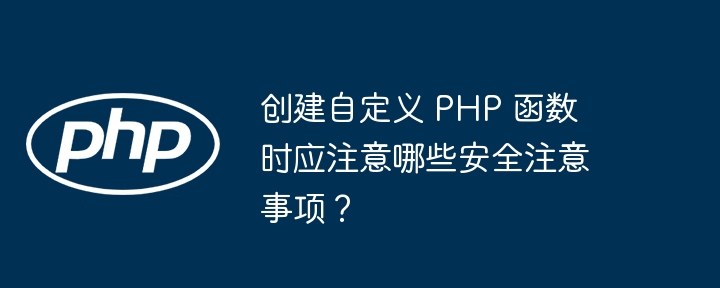
Security considerations for PHP custom functions include: validating user input to prevent injection and cross-site scripting attacks; limiting function usage to prevent type coercion attacks; using parameter whitelists to only allow expected input values; escaping output , prevent cross-site scripting attacks; restrict function access, hide implementation details and prevent unauthorized access.

When creating custom functions in PHP, it is crucial to ensure their security to prevent Potential malicious use. Here are some key security considerations:
Use the filter_input() or filter_var() function to validate user input , to ensure it is well-formed and contains the expected data. By eliminating malicious characters, you can prevent code injection and cross-site scripting attacks.
<?php
function sanitizeInput($input) {
return filter_input(INPUT_POST, $input, FILTER_SANITIZE_STRING);
}
?>Use the declare(strict_types=1); statement to enable strict typing and force the use of typed variables. This helps prevent type coercion attacks, where an attacker attempts to pass an unexpected value to a function.
<?php
declare(strict_types=1);
function sum(int $a, int $b): int {
return $a + $b;
}
?>Create a parameter whitelist that only allows expected input values. Use the in_array() or array_key_exists() function to check if the input matches the whitelist.
<?php
function checkRole($role) {
$validRoles = ['user', 'admin', 'moderator'];
return in_array($role, $validRoles);
}
?>Use htmlspecialchars() or htmlentities() function to escape output to prevent cross-site scripting attacks, This attack allows an attacker to inject malicious code on your website.
<?php
function displayMessage($message) {
echo htmlspecialchars($message);
}
?>Use visibility specifiers (public, protected, private) to restrict functions Access. This helps hide implementation details and prevent unauthorized access.
<?php
class User {
private function getPassword() {
// ...
}
}
?>Consider a sample PHP function that allows the user to enter an email address for verification. By following these security considerations, we can ensure that our functions are safe and secure:
<?php
function validateEmail($email) {
// 验证输入
$email = filter_input(INPUT_POST, 'email', FILTER_SANITIZE_EMAIL);
// 检查电子邮件格式
if (!filter_var($email, FILTER_VALIDATE_EMAIL)) {
throw new InvalidArgumentException('Invalid email address');
}
// 检查长度
if (strlen($email) > 255) {
throw new InvalidArgumentException('Email address too long');
}
// 检查域名是否存在
$domain = explode('@', $email)[1];
if (!checkdnsrr($domain, 'MX')) {
throw new InvalidArgumentException('Invalid domain');
}
return true;
}
?>By following these security considerations, we can ensure that our custom PHP functions are safe from common attacks and protect users and applications.
The above is the detailed content of What security considerations should you be aware of when creating custom PHP functions?. For more information, please follow other related articles on the PHP Chinese website!
 How to repair lsp
How to repair lsp
 The difference between array pointer and pointer array
The difference between array pointer and pointer array
 How to open jsp
How to open jsp
 Introduction to the meaning of cloud download windows
Introduction to the meaning of cloud download windows
 How to use question mark expression in C language
How to use question mark expression in C language
 socketpair usage
socketpair usage
 How redis solves data consistency
How redis solves data consistency
 The difference between JD.com's self-operated flagship store and its official flagship store
The difference between JD.com's self-operated flagship store and its official flagship store




